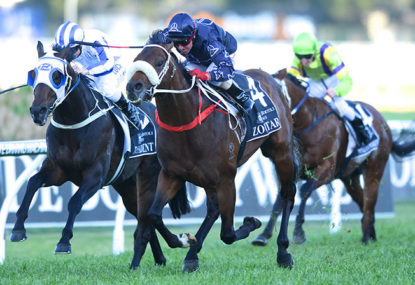Vile, vulgar, vicious and at times, misogynistic. These words could be used to describe the nasty tweets that get directed at jockeys through social media on a weekly basis.
Last week, Racing Victoria stewards announced they would push a national policy which would increase regulation of social media use among licensed individuals. The policy would monitor and punish social media use deemed inappropriate by jockeys, trainers and owners.
This could cover anything and everything from trainers hyping up horses to frustrated owners venting their spleen.
But as I scrolled through Twitter on the weekend, the inappropriate use of social media was not coming from owners or industry personnel – it was coming from punters.
Hell hath no fury like a woman punter scorned.
“@(jockey) stick to riding (boyfriend’s name) and modelling cause after watching u SLAUGHTER (horse’s name) I think your Jockey days r up !!!!” tweeted one punter.
“@(jockey) @(jockey) Maybe punters wouldn’t have empty pockets if you weren’t such terrible jockeys?” tweeted another.
Social media, Twitter in particular, has made contacting jockeys easier than ever. In the space of 140 characters, an individual can vent their frustrations by directing nasty comments toward jockeys riding the horse they bet on.
It’s disgusting to see.
Occasionally a few will defend themselves like Brad Rawiller did.
“Getting potted from everywhere.. But did anyone watch the first 50m? How could I have held the inside from trouble in vegas? #justcurious,” he tweeted.
While team sports like football and basketball hold millions of dollars in betting pools, no individual sport in the world holds more money than horse racing.
It’s a high-pressure environment where jockeys put their lives at risk every time those gates open. Confidence is paramount and without it, jockeys frequently fall into form slumps, lose rides and lose support.
When a jockey produces a bad ride, they know it. They don’t need to be abused by punters via social media.
As with most professional sports, errors are most commonly made by younger athletes and the same happens in horse racing. It’s why there is such longevity in the senior riding ranks.
If a jockey is good enough to make few enough mistakes, they can comfortably ride into their late 40s.
But getting through their mid-20s is their biggest difficulty. As they come through the system as youngsters, they are gifted with weight allowances that make them attractive hires for owners.
These same youngsters are also the most at risk on social media.
They make easy targets due to their lower reputations and they are more active on social media than the veterans who were riding horses before the social media boom.
Thrust into the limelight where country betting pools hold more than $50,000 per race while city pools are upwards of $100,000, it’s a lot to fathom for young jockeys paving their way.
It’s also something which has absolutely no relevance to their jobs and therefore the equivalent of a punter’s opinion.
Punters seem most frustrated when a short-priced favourite gets beaten but seem to ignore the fact that jockeys have absolutely no control over their mount’s odds.
Market prices are dictated by the punters, so when an odds-on favourite gets rolled, the punters did it to themselves.
Rarely do we see venting when a long shot gets rolled.
Abuse via social media has been making headlines over the past fortnight due to the unfortunate circumstances around Charlotte Dawson’s death, and the aggression of punters towards jockeys on social media is escalating.
In racing, jockeys are required to make split-second decisions. When they lack confidence, they make mistakes.
Everyone does.
Rather than venting anger towards jockeys, punters should be looking at themselves.
In this caper, you should never be betting with anything you’re not prepared to lose, and if a punter’s reaction is so heated that it warrants abusing a jockey, there’s a good chance they weren’t prepared to lose their stake.
With its ease of direct communication and frequency of usage among racing fans, social media will play a big role in the development of racing over the coming years.
We’ve already seen social media regulation affect other sports and horse racing is now catching up. Jockeys, though, have no team to shelter them.
They don’t have multimillion dollar sponsorship deals, and the ones starting their careers make enough to get by, if that. Racing is not a glamour sport like football or basketball where misuse of social media often surrounds brand image and reputation.
Social media gives us unprecedented insights into jockey’s thoughts, and to see it misused by punters is disappointing.
Regulating punter social media accounts will never be possible but if punters want better consistency from jockeys, they should keep their frustrations to their living rooms and stop talking through their wallets.





























































































